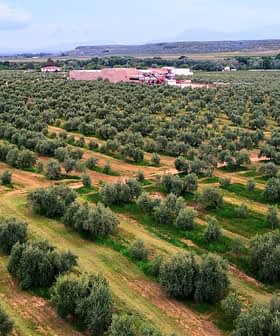 6.6K reads
6.6K readsBasics
Why Extra Virgin Olive Oil Is Linked with Lower Dementia Risk, Better Brain Health

Dementia, particularly Alzheimer’s disease, is a growing concern as the population ages. Extra virgin olive oil, rich in polyphenols and monounsaturated fatty acids, has been linked to improved cognitive function and reduced risk of dementia-related death. Adherence to the Mediterranean diet, which includes olive oil as a primary fat source, has been associated with a reduced risk of dementia and other diseases, showcasing the potential benefits of this dietary pattern on brain health and overall well-being.
Dementia has been a companion of old age since ancient times, but recognizing the mechanisms responsible is only now beginning to emerge.
Named after German psychiatrist Alois Alzheimer, Alzheimer’s disease is estimated to be the cause of 60 to 80 percent of cases of dementia worldwide and is inevitably fatal.
Marked by cognitive decline and memory loss, the disease affects ten percent of people over the age of 65 and 40 percent over the age of 80.
See Also:Olive Oil BasicsWhile deaths from diseases such as stroke and heart disease have been decreasing since 2001, age-standardized dementia mortality rates have risen over the same period.
There are currently more than 55 million Alzheimer’s cases worldwide, and this figure is expected to triple by 2050 as both population and life expectancy increase.
Although numerous experimental treatments for the disease are in development, most research is focused on prevention.
Numerous studies have demonstrated that consuming extra virgin olive oil is linked to improved cognitive function and reduced risk of dementia.
In a recently published cohort study of 92,383 United States adults observed over 28 years, consuming more than seven grams of olive oil per day was associated with a 28 percent lower risk of dementia-related death than never or rarely consuming olive oil.
Unlike those of many previous studies, these results were found to be irrespective of general diet quality.
Polyphenols disrupt plaque accumulation and mitigate inflammation
Polyphenols are a group of natural compounds found in plants, including olives, known for their antioxidant properties.
They have various health benefits, including potential protection against cardiovascular and neurodegenerative diseases.
Extra virgin olive oil is renowned for its rich polyphenol content, which provides most of its health benefits and contributes to its unique flavor and aroma.
Extra virgin olive oil contains 25 polyphenols, including oleocanthal, oleacein, oleuropein and hydroxytyrosol.
Of these, oleocanthal and oleuropein are the most strongly associated with the prevention and mitigation of neurodegenerative diseases such as Alzheimer’s. Current research suggests that there are multiple ways in which this occurs.
See Also:Health NewsOleuropein aglycone (an oleuropein compound) can induce autophagy, a natural process that eliminates clumps of proteins and damaged organelles (cell components) and stops them from accumulating. Two proteins in particular are associated with this type of accumulation in forms of dementia, such as Alzheimer’s.
Amyloid-beta precursor protein is implicated in various biological functions, from the formation and repair of synapses to hormone regulation. It also forms amyloid-beta, which is toxic to neurons.
Amyloid-beta readily accumulates, forming small clusters called oligomers and eventually accumulating into bulky amyloid plaques.
These accumulations are dangerous for several reasons. They can trigger inflammation through an immune response and may also induce the production of abnormal tau protein.
Tau protein is essential to maintaining the correct structure of neurons. However, when tau protein molecules become damaged, they can detach and form clusters known as neurofibrillary tangles. When this happens, neuron death follows, disrupting the transmission of messages within the brain.
Autophagy deficiency has been discovered in Alzheimer’s patients, as have elevated levels of amyloid oligomers and plaques and neurofibrillary tangles.
See Also:Researchers Use AI to Identify the Olive Oil Compounds that Affect Alzheimer’sTherefore, oleuropein’s ability to induce this process is potentially an important mechanism by which extra virgin olive oil can protect against neurodegeneration.
Amyloid plaque is also present in the brains of older adults who do not develop Alzheimer’s, implying that there is more than one factor at play.
Neuroinflammation, the activation of glial cells, such as microglia and astrocytes, which hold neurons in place and aid their normal function, is a strong candidate.
The activation of these cells causes the production of inflammatory factors such as cytokines and chemokines, which have been observed surrounding plaques and impaired neurons in the brains of Alzheimer’s patients.
Phenolic compounds found in extra virgin olive oil, such as hydroxytyrosol and oleuropein, have demonstrated the ability to impede the translocation of nuclear factor kappa B (NFkB) into the nucleus, leading to diminished production of pro-inflammatory agents and thus curbing neuroinflammation driven by microglia.
Moreover, these compounds have been observed to enhance the secretion of anti-inflammatory cytokines while suppressing the production of pro-inflammatory cytokines, presenting a multifaceted approach to combating neuroinflammation.
MUFAs linked with better brain healthvia the cardiovascular system
In addition to its high polyphenol content, olive oil is rich in monounsaturated fatty acids (MUFAs).
The famous Seven Countries Study discovered that different fats could have very different effects on health. The study revealed that people in Greece and other parts of the Mediterranean enjoyed a low rate of heart disease despite a high-fat diet.
The researchers concluded that this was because the primary fats in their diet were not the saturated animal fats common in countries with higher rates of heart disease but the monounsaturated fats of olive oil.
Strong evidence exists linking cardiovascular disease and Alzheimer’s, so reducing the former is one of many strategies seen as essential to prevention.
The replacement of saturated fats with monounsaturated fatty acids such as oleic acid has a proven track record in this area. Oleic acid is the major component of olive oil, constituting 70 to 80 percent.
See Also:Study Reveals Insights Into the Impact of Olive Oil Fats on Essential Cell StructuresIn addition to helping to regulate immune function, research has shown that when it is used to replace dietary saturated fat, monounsaturated fat reduces the risks of cardiovascular disease by decreasing levels of blood lipids such as cholesterol.
It has also been demonstrated that increasing and decreasing the latter in human blood serum improves the HDL (high-density lipoprotein) to LDL (low-density lipoprotein) ratio.
One significant way in which cardiovascular disease may contribute to the development of dementia is through the deterioration of the blood-brain barrier. This barrier refers to the specialized properties of the central nervous system’s vascular system that control the exchange of ions, molecules and cells between the blood and the brain.
When it becomes dysfunctional, the blood-brain barrier can allow toxic molecules into the brain and impair the elimination of toxic substances such as amyloid-beta and abnormal tau proteins.
This can lead to increased neuroinflammation and oxidative damage, which has also been linked to Alzheimer’s.
Research has found that the regular consumption of extra virgin olive oil reduces the permeability of the blood-brain barrier in the hippocampi and surrounding area, thus helping to restore normal function.
EVOO and the Mediterranean diet
Multiple studies have concluded that adherence to the Mediterranean diet corresponds to a reduced risk of dementia, including Alzheimer’s disease.
A 2023 cohort study from the United Kingdom Biobank found that the higher an individual’s adherence, the lower their risk of developing dementia. Strikingly, this was found to be true regardless of genetic predisposition.
A separate 2023 U.S. study found that levels of five micronutrients common in the Mediterranean diet were significantly lower in the brains of those who had died with Alzheimer’s disease than those who had died without it.
The study analyzed the brains of 31 donors whose average age at death was 75 and found that the brains of those with the disease had around half the levels of lycopene, retinol, lutein, zeaxanthin and vitamin E.
Although the body only needs these substances in small amounts, they are crucial to maintaining many bodily systems, such as the immune system, the eyes and the skin.
See Also:Mediterranean Diet and Exercise Associated with Better Gut Health in Older AdultsMediterranean countries are historically among the healthiest countries in the world, recording relatively low rates of cardiovascular diseases and cancer, as well as longer life expectancy.
On the purely dietary front, the Mediterranean diet is based on the daily consumption of fruits, vegetables, legumes, nuts, whole grains and some dairy, with extra virgin olive oil serving as the primary source of fat.
The Spain-based Mediterranean Diet Foundation, one of the most influential organizations dedicated to researching and promoting the Mediterranean diet, defines the diet as a way of life. In the foundation’s view, lifestyle and values form a vital part that can not be separated from the whole.
This is reflected in its Mediterranean diet pyramid. Unlike more familiar food pyramids, the base is built from a combination of exercise, rest, socializing, and cooking on the physical front and a commitment to sustainable, local, seasonal and eco-friendly food choices on the value front.
While more research is needed to determine how the Mediterranean diet helps the body avoid and combat so many diseases, its benefits to human health are already firmly established.
Know the Basics
Things to know about olive oil, from the Olive Oil Times Education Lab.
Extra virgin olive oil (EVOO) is simply juice extracted from olives without any industrial processing or additives. It must be bitter, fruity and pungent — and free of defects.
There are hundreds of olive varieties used to make oils with unique sensory profiles, just as many varieties of grapes are used in wines. An EVOO can be made with just one variety (monovarietal) or several (blend).
Extra virgin olive oil contains healthy phenolic compounds. Substituting a mere two tablespoons of EVOO per day instead of less healthy fats has been shown to improve health.
Producing high-quality extra virgin olive oil is an exceptionally difficult and costly task. Harvesting olives earlier retains more nutrients and extends shelf life, but the yield is far less than that of fully ripe olives that have lost much of their healthy compounds.









